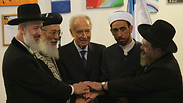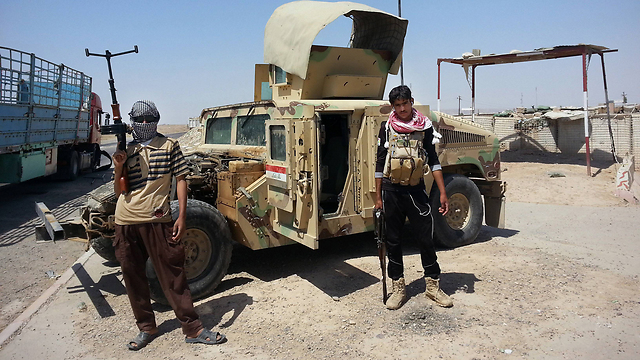
Amid growing violence, some in Arab world call for tolerance
Speaking out against extremism, Palestinian author says Islamic State distorts Islam; Al Quds professor says 'dictators plagued region for decades with corruption, lack of freedom of expression.'
Palestinian diplomat and author Ahmed Metani is concerned about growing violence in the West Bank and Gaza Strip, as well as in the broader Arab world. He has written a novel that he hopes will encourage Palestinians to accept a “culture of tolerance.”
“Over the past three or four years, you can’t turn on the television, without hearing about killing and seeing blood (in the region). People are shouting Allah Akbar, and showing Islam (as violent). I reject this killing,” Metani told The Media Line, on a visit to the West Bank from Malaysia, where he serves at the PLO Embassy.
Metani says that Islamic State (IS) which has carried out high-profile executions of Westerners and seeks to establish a Muslim “caliphate” harking back to the days of the prophet Mohammed, is a perversion of Islam. West Bank Sheikh Abu Ali told The Media Line that true Islam means Muslims should respect one other, not fight each other.
In Syria, for example, almost 200,000 civilians and fighters have died in more than three years of a bloody civil war. Almost all of the deaths were Muslims who support Syrian President Bashar Al-Assad, or Muslims who want to overthrow him.
Author Metani’s novel centers around a teacher, Noman, who tries to convince a non-educated, traditional Palestinian man to allow women to attend school. In some parts of the Arab world it is not acceptable for women to go out in public to attend school. Metani says that social change must occur through non-violence.
“Tolerance of the other starts at home with the way parents act toward their children,” he said.
Learning tolerance could help resolve the differences among Palestinians as well, he says. Rivalry between the Islamist Hamas and the Fatah movement led by Palestinian Authority president Mahmoud Abbas persists despite their agreement on a national unity government.
“The problem comes from lack of education and ideologies in Palestinian parties but if I listen to you, I accept you and I accept the differences (among us),” he said. By not making it about a particular person or incident, he believes there is an increased chance of getting the message through.
Although the Palestinian people are his intended audience, he hopes the book, written in Arabic, will reach other Arab countries in the Middle East.
Metani says imams who lead daily prayers and preach weekly sermons could help establish a culture of tolerance by preaching against the use of violence and calling for tolerance. He also hopes that the Palestinian Ministry of Education will make his book required reading.
Other Palestinian analysts say that beyond intolerance, Arab states must end corruption.
“Dictators basically plagued the region for decades with corruption, lack of freedom of expression,” Mustafa Abu Sway, Dean, College of the Qur'an and Islamic Studies at Al-Quds University told The Media Line.
Without “good governance, transparency or popular participation”, he says it’s “inevitable” for there to exist a situation like the one that exists in the Middle East, today.
“People reach a stage where nothing is tolerated. There is a sense of collapse of order, there’s a lack of leadership, especially spiritual leadership,” Abu Sway said. “There’s a genuine need for a respectful good dialogue internally but ultimately a dialogue with the outside world. But it must be based on equal footing and respect,” he says.
Meanwhile, Metani has been touring the West Bank passing out signed copies of his book.
“If God respects the human being, why don’t we respect ourselves?” he asked.
Article written by Linda Gradstein.
Reprinted with permission from The Media Line.











